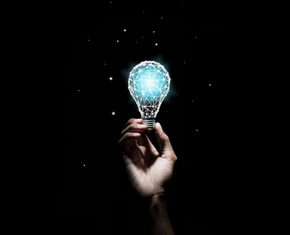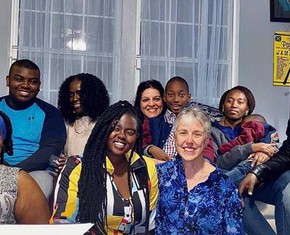The views expressed in our content reflect individual perspectives and do not represent the authoritative views of the Baha'i Faith.
We all know how we got here – as the result of an ages-old biological process, where female egg meets male sperm, gestation occurs for around 39 weeks, and we emerge into the world as newborns.
After that arduous birth, of course, each neonate immediately wants two things: food and sleep. One comedian said that if babies could keep journals, they’d all read “Day two – still tired from the move.”
Every sleepy, hungry baby enters a unique environment, culture, society, family, time and place. That environment may be loving and kind or harsh and brutal, but somehow most babies grow and develop, learn the ways of our society, and find the best means we can for surviving and hopefully thriving.
But beyond the biology, how did we get here, now, at this point in time, at this place in our lives, in an environment we have settled into or have created for ourselves? What constructs our reality?
Many of us had no real choices, caught up in the streams of circumstance, limited by our own resources or access to them, circumscribed in our potential. Others, able to break the bonds of birth limitations and environment, made or forged their own paths, using will and wits to better themselves, to achieve more, succeed more, to become more than they might otherwise have been.
In either case each one of us faces that same reality: To give up trying and be content with what we have, or to push forward toward better outcomes.
As I listened recently to the Talking Heads song Once in a Lifetime, it made me ponder these questions. The song repeats a haunting refrain: “You may find yourself …” in one scenario or another. “… you may ask yourself, ‘How did I get here?’” What a wonderful question! It goes to the root of who we are, of why we choose to do what we did and not something else. Every choice we make in the “here and now” has implications, consequences and import for the future that we may not realize at the time.
So “Here and now” means much more than the time, place and circumstances we find ourselves in. “Here and now” represents a certain reality, a certain belief system, a certain attitude and drive. “Here and now” indicates what we do and what we can do to bring about unity and peace for all humanity. That reality, the Baha’i teachings say, will provide true satisfaction in our own lives:
The foundation of progress and real prosperity in the human world is reality, for reality is the divine standard and the bestowal of God. Reality is reasonableness, and reasonableness is ever conducive to the honorable station of man. Reality is the guidance of God. Reality is the cause of illumination of mankind. Reality is love, ever working for the welfare of humanity. Reality is the bond which conjoins hearts. This ever uplifts man toward higher stages of progress and attainment. Reality is the unity of mankind, conferring everlasting life. Reality is perfect equality, the foundation of agreement between the nations, the first step toward international peace. – Abdu’l-Baha, The Promulgation of Universal Peace, p. 376.
Each one of us faces certain realities in our lives: Where do I obtain food? Water to drink? Clothes to wear? Where can I live and work? How do I provide for my children, and ensure their education and training? How can I be happy? We constantly make efforts to provide answers to these and many more questions. In one sense, these questions drive our entire lives.
More and more, people realize that what we need to be happy in the physical world means more than just material well-being and material things. Yes, of course, we all need the basic necessities. However, only the things of the spirit will bring true happiness. Abdu’l-Baha spoke of happiness as the conjoining of the spiritual importance of the East with the material accomplishments of the West when he said:
But the honor of the human kingdom is the attainment of spiritual happiness in the human world, the acquisition of the knowledge and love of God. The honor allotted to man is the acquisition of the supreme virtues of the human world. This is his real happiness and felicity. But if material happiness and spiritual felicity be conjoined, it will be “delight upon delight,” as the Arabs say. We pray that God will unite the East and the West in order that these two civilizations may be exchanged and mutually enjoyed. I am sure it will come to pass, for this is the radiant century. This is an age for the outpouring of divine mercy upon the exigency of this new century – the unity of the East and the West. It will surely be accomplished. – Ibid., p. 166.
The reality of here and now requires knowing your true self and understanding what truly makes you happiest: trying to please only yourself, or trying to also make others happy.
















Comments
Sign in or create an account
Continue with Googleor